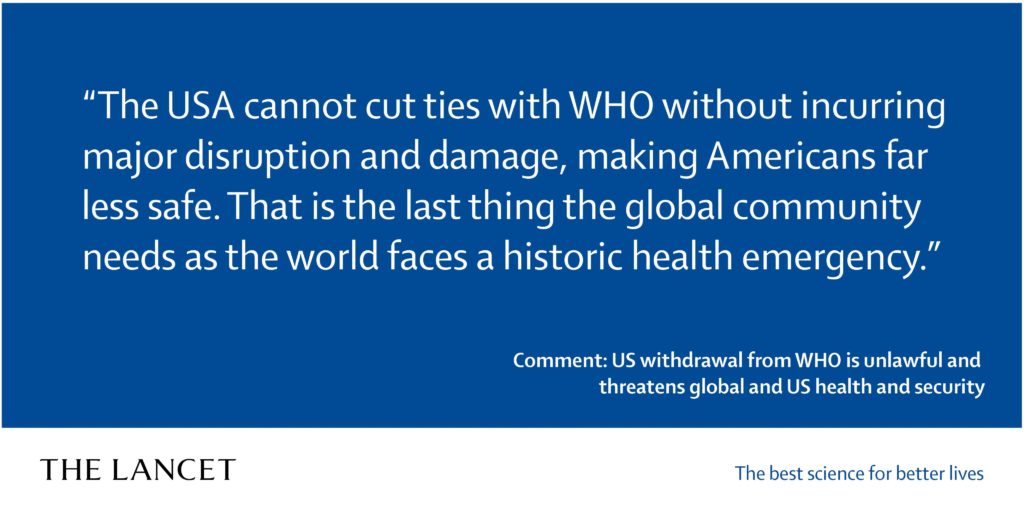Published: 07/10/2020
Banner photo by Eric Bridiers; CC BY-ND 2.0 license.
In response to the Trump administration’s formal notice of the US withdrawal from the WHO, a group of health leaders coauthored a condemning comment piece in The Lancet. Though the announcement was anticipated, the move is nonetheless astonishing, coming at a time of dire consequence for human health, both in the US and abroad.
The WHO has fulfilled a crucial global role during the pandemic, providing millions of masks, gloves, and diagnostic kits to the international community, coordinating clinical trial efforts for treatments, deploying medical teams to over 16 countries. These efforts only represent the tip of the iceberg—significantly larger international relief and coordination efforts by the WHO are already underway.
Still, it would be shortsighted to look only at the organization’s recent COVID-19 response. In a recent webinar on the anticipated US departure of the WHO, Dr. Michele Barry, Director of Stanford’s Center for Innovation in Global Health and one of the coauthors of the Lancet comment, spoke of the indisputable milestones set by the WHO.
“It is the one form of shared global governance we have around health,” Dr. Barry said.
These feats represent the globe’s crowning achievements and critical landmarks towards global health and well-being, including the Alma-Ata Declaration on primary health care, the eradication of smallpox, the Framework Convention on Tobacco Control, and the Revision of the International Health Regulations, a crucial agreement between 196 countries that enabled the initial detection of COVID-19 and historically-unprecedented rapid international response.
It may be easy for the public to lose sight of these successes in light of the ongoing COVID-19 crisis, especially while cases continue to rise at a disturbing rate and more countries face increasingly dire circumstances.
The US is the largest contributor to the WHO. And yet, this global organization, tasked with the mission of the “attainment by all peoples of the highest possible level of health,” operates on a tight budget, about $4.84 billion for a two year period.

“About the budget of a big teaching hospital in the United States,” commented Dr. Barry.
These are not the characteristics of a frivolous and resource draining institution. For example, the Global Outbreak and Response Network (GOARN) consists of only 8 operational staff. This small WHO team is responsible for fostering regional and global networks of institutions to deliver a comprehensive response to public health emergencies like COVID-19.
“I have to say, eight operational staff for the entire world for global outbreak is really what I would call a really small and underfunded group,” said Dr. Michele Barry.
The WHO is one of the only organizations that is equipped to defend us against the threats that transcend borders. Health, as has been clearly demonstrated, is a critical vulnerability, and the United States’s decision to withdraw funding from the WHO drastically jeopardizes not only the world’s health security, but the health outcomes of countless United States citizens as well. The need for a global response and international coordination for a health emergency has never been more clear or pertinent. And yet, it is exactly now that the agency most capable of coordinating that response is being deliberately gutted by its largest, most essential funder.

“We need nations to work together to beat this virus and other emerging health threats to the world,” said Dr. Barry. “The WHO is the one entity whose main mission is to enable a global vision and issue guidelines and workable frameworks geared towards health equity for the world. It is our wake-up sentinel alarm to health threats.”
Read Dr. Barry and her colleagues’ comment in the Lancet: US withdrawal from WHO is unlawful and threatens global and US health and security.
Lucas Oliver Oswald
Global Health Communications Manager, Center for Innovation In Global Health, Stanford University